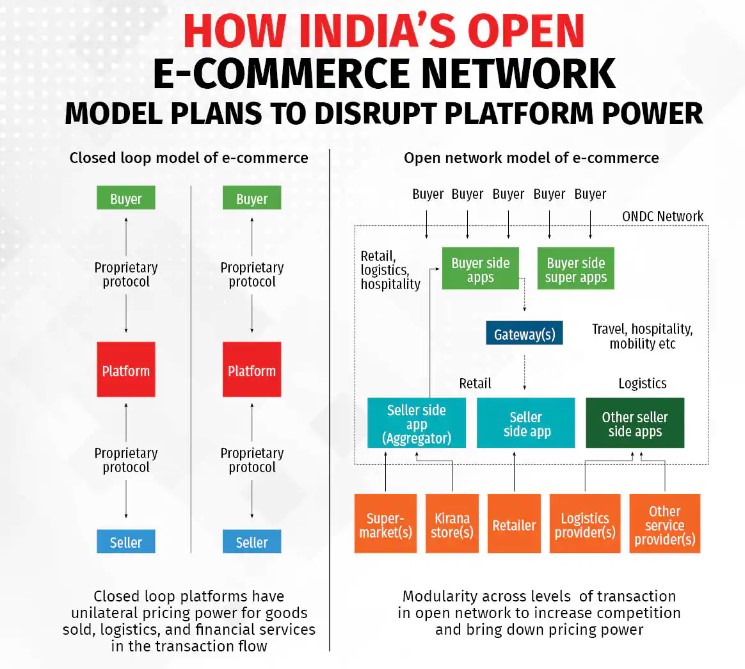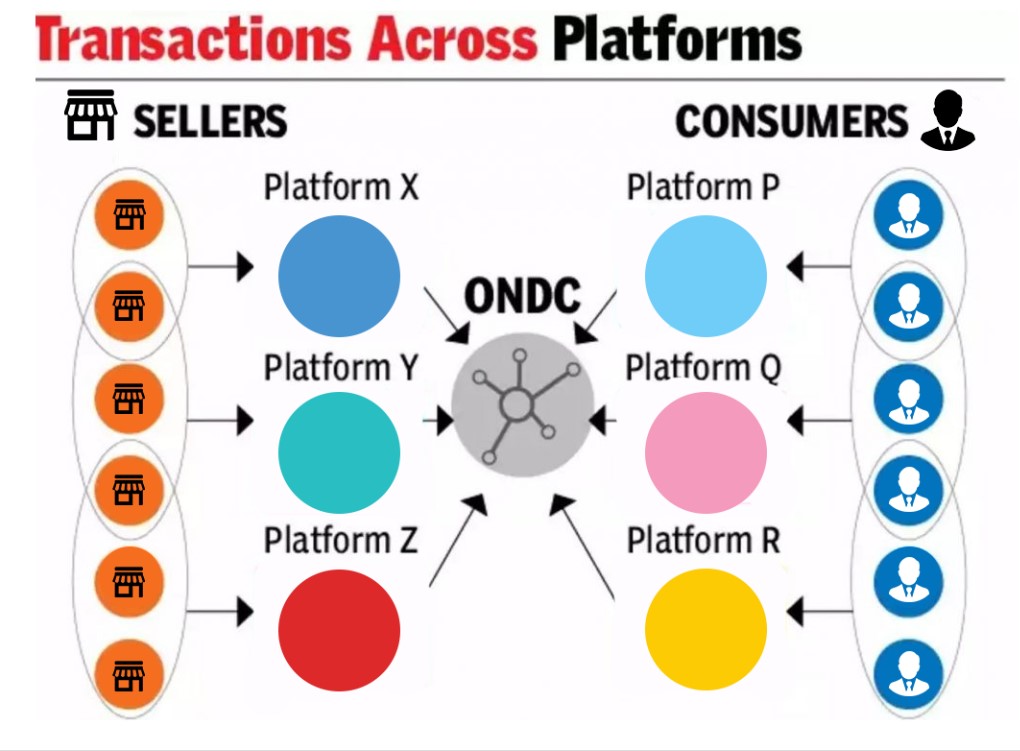
Open Network for Digital Commerce (ONDC) is a network based on open protocol and will enable local commerce across segments, such as mobility, grocery, food order and delivery, hotel booking and travel, among others, to be discovered and engaged by any network-enabled application.
The platform aims to create new opportunities, curb digital monopolies and by supporting micro, small and medium enterprises and small traders and help them get on online platforms. It is an initiative of the Department for Promotion of Industry and Internal Trade (DPIIT) under the Ministry of Commerce and Industry.

Features of ONDC
ONDC, a UPI of e-commerce, seeks to democratise digital or electronic commerce, moving it from a platform-centric model to an open-network. Through ONDC, merchants will be able to save their data to build credit history and reach consumers.
The proposed government-backed platform aims to create a level playing field for e-commerce behemoths such as Amazon, Flipkart, and offline traders who have been crying foul at the unfair trade practices of these e-tailers. The platform will also be compliant with the Information Technology Act, 2000 and designed for compliance with the emerging Personal Data Protection Bill.
In this system, ONDC plans to enable sellers and buyers to be digitally visible and transact through an open network, regardless of what platform or application they use. It will also empower merchants and consumers by breaking silos to form a single network to drive innovation and scale, transforming all businesses from retail goods, food to mobility.
The new framework aims at promoting open networks developed on open-sourced methodology, using open specifications and open network protocols independent of any specific platform.
It is expected to digitise the entire value chain, standardise operations, promote inclusion of suppliers, derive efficiencies in logistics and enhance value for consumers.
According to the government’s official statement, ONDC shall take all measures to ensure confidentiality and privacy of data in the network. ONDC shall not mandate sharing of any transaction-level data by participants with ONDC. Will work with its participants to publish anonymised aggregate metrics on network performance without compromising on confidentiality and privacy.
Presently, ONDC is in its pilot stage and the government has set up a nine-member advisory council, including Nandan Nilekani from Infosys and National Health Authority CEO R S Sharma, on measures needed to design and accelerate the adoption of ONDC.
Open Network for Digital Commerce (ONDC) is an initiative aiming at promoting open networks for all aspects of exchange of goods and services over digital or electronic networks. ONDC is to be based on open-sourced methodology, using open specifications and open network protocols independent of any specific platform.
The foundations of ONDC are to be open protocols for all aspects in the entire chain of activities in exchange of goods and services, similar to hypertext transfer protocol for information exchange over internet, simple mail transfer protocol for exchange of emails and unified payments interface for payments.
These open protocols would be used for establishing public digital infrastructure in the form of open registries and open network gateways to enable exchange of information between providers and consumers. Providers and consumers would be able to use any compatible application of their choice for exchange of information and carrying out transactions over ONDC.
Thus, ONDC goes beyond the current platform-centric digital commerce model where the buyer and seller have to use the same platform or application to be digitally visible and do a business transaction.
ONDC protocols would standardize operations like cataloguing, inventory management, order management and order fulfilment. Thus, small businesses would be able to use any ONDC compatible applications instead of being governed by specific platform centric policies. This will provide multiple options to small businesses to be discoverable over network and conduct business. It would also encourage easy adoption of digital means by those currently not on digital commerce networks.
ONDC is expected to make e-Commerce more inclusive and accessible for consumers. Consumers can potentially discover any seller, product or service by using any compatible application or platform, thus increasing freedom of choice for consumers. It will enable the consumers to match demand with the nearest available supply. This would also give consumers the liberty to choose their preferred local businesses. Thus, ONDC would standardize operations, promote inclusion of local suppliers, drive efficiencies in logistics and lead to enhancement of value for consumers.
Benefits:-
- Seller – Get an equal opportunity to compete with large market players and become discoverable online.
- Buyers – Enjoy a seamless shopping experience from a wide assortment of products across categories in a single checkout experience.
- Tech Companies – Rapid adoption of products and services and achieving scale in go-to-market efforts.
- FinTech – Provide credit and financing solutions to all entities engaged in e‑commerce.
- ONDC is expected to make E-Commerce more inclusive and accessible for consumers.
- Consumers can potentially discover any seller, product, or service by using any compatible application or platform, thus increasing freedom of choice for consumers.
- It will enable the consumers to match demand with the nearest available supply. This would also give consumers the liberty to choose their preferred local businesses.
- Thus, ONDC would standardize operations, promote inclusion of local suppliers, drive efficiencies in logistics and lead to enhancement of value for consumers.
- The digital market will be widened to accommodate more Micro, Small, and Medium Enterprises (MSMEs) and small traders in the country.
- The monopolies of large e-commerce companies will be broken leading to improvement in access, innovation, and variety of businesses.
- The transparent rules will attract more investments into businesses in the e-commerce space.